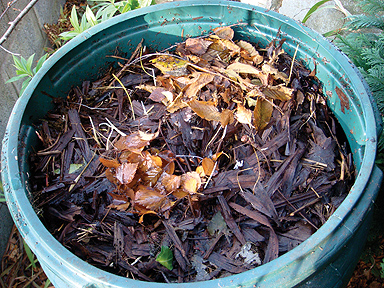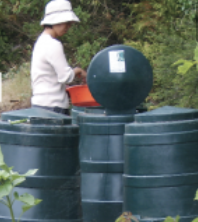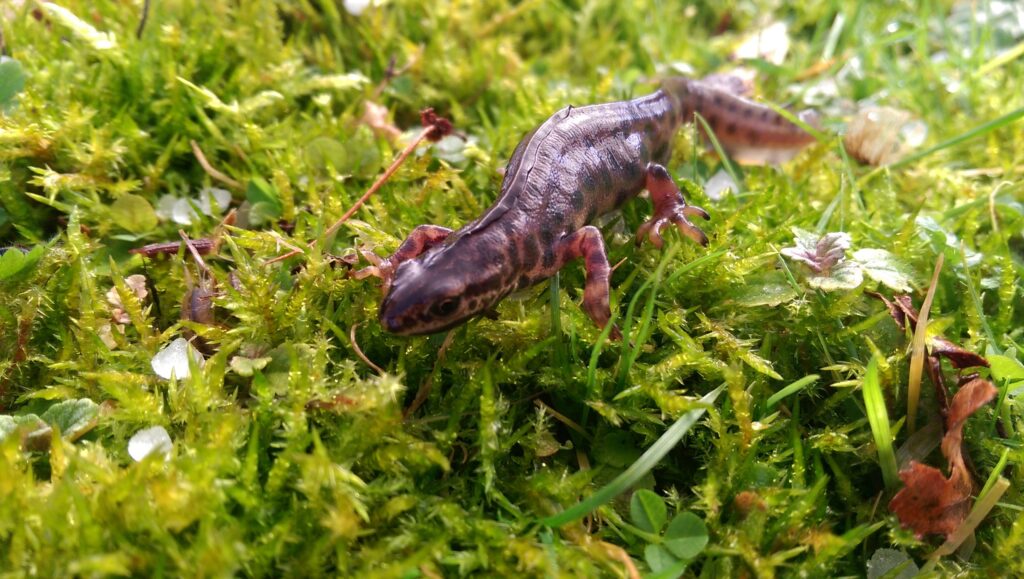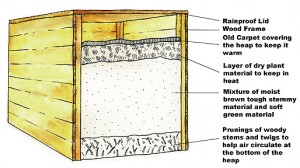


Compost is decomposed or rotted organic material. ‘Organic’ means that the material was, at one stage, part of a living organism, whether plant or animal.
Why Should I Compost?
Composting has many benefits:
- you can reduce by a half or more, the volume of waste that you put out with your rubbish – this can save you money.
- if everyone composted at home, the amount of rubbish going to landfill would be reduced and there would be less demand for opening new ones!
- composted organic waste is a very valuable resource. It can be used to feed your garden, potted plants, greenhouse plants, window-box flowers etc. It is also an excellent soil conditioner that helps aerate the soil. This saves you money as you don’t need to buy compost.
- by using your own peat-free compost in your garden, you are helping to save the last of Ireland’s bogs.
- compost heaps are homes for fascinating wildlife, and can provide food for birds and hedgehogs.
So How Do I Compost?
It’s dead easy. Just remember, composting is a natural process and even if you do nothing more than dump your organic waste in a heap, compost will simply happen! There are many different composting methods and containers. These vary depending on your needs and the amount and type of organic waste are composting. For most people, the choice is between a composting cone and a compost heap.
| Heap | Cone |
| Can deal with large volumes of waste | Only handles a small volume of waste |
| Best suited to a large garden with enough space to construct two heaps side by side for ease of turning |
Ideal and tidy for a small garden |
| Generate heat which helps the composting process | Don’t heat up |
| Made from wood so will need to be replaced periodically | Made from plastic so will last a long time |
| Work best when turned | Don’t need to be turned |
A Design for Making A Compost Heap
 If you have the space make a second heap alongside the first one to help when turning the heap.
If you have the space make a second heap alongside the first one to help when turning the heap.
Is There Anything that I Shouldn’t Put on My Compost Heap/Cone?
Materials such as glass, metal or plastics, cannot be composted as these are synthetic. Cat or dog faeces should also be avoided as these can contain dangerous pathogens. Adding coarse woody material and conifer hedge clippings will significantly slow down the composting process. If you want to add woody material, it is best to shred it first. You should avoid adding meat, fish and any cooked foods these tend to attract rodents and flies. However, if you want to compost meat and cooked food remains, then you can do this in a wormery.
How is My Organic Waste Turned into Compost?
The ‘waste’ that you put onto your compost heap/cone is food for numerous creatures such as microscopic bacteria. These begin the decomposition process and then other organisms such as worms, millipedes and beetles continue the process until you are left with a nutrient-rich compost.
Does it Matter How Much of the Different Materials I Put In?
Yes, it is important to get roughly the right proportions of different materials. Basically there are two types of materials these are referred to ‘greens’ and ‘browns’. GREEN materials are wet, soft, green and high in nitrogen. BROWN materials are dry, harder, absorbent and high in carbon. You should aim for roughly three times the amount of browns as greens in your compost heap/cone. This helps to keep the compost moist but not too wet and also supplies your ‘compost workers’ with essential nitrogen and carbon. If you cut everything up before adding it to the heap, this will greatly increase the rate at which compost is made and it will ensure a finer grade of compost is produced.
| Greens | Browns | Do Not Add |
| Grass cuttings | Straw and hay | Meat or fish scraps |
| Weeds/nettles (avoid weed seeds if possible) |
Coffee grounds | Grease, oil, cooked food scraps |
| Urine & manure | Dry plant stems and twigs | Cat litter |
| Raw fruit and veg | Scrunched up paper | Dog or cat faeces |
| Fresh plants | Torn up cardboard (e.g. cereal
boxes, eggboxes, toiletroll centres etc.) |
Barbeque or coal ashes |
| Tea leaves | Pet and human hair | |
| Seaweed, algae and garden pond cleanings | Egg shells | |
| Wood/peat ashes |
Will It Smell Bad?
No, not if you are adding the right things in roughly the right proportion. If there is an unpleasant smell coming from your compost heap/bin, then it is either lacking air or it is too wet.You need to aerate the heap and perhaps add some dry materials. To prevent this from happening in the first place, add plenty of scrunched up paper and torn cardboard as you go. This helps to get rid of all of those envelopes, toilet roll centres, cereal boxes etc. Also, especially if you have a compost heap, you should regularly aerate your compost by turning it or loosening it with a fork.
What Can I Use The Compost For?
Compost is an ideal, nutrient rich compost. It supplies plants with nutrients, improves the structure of the soil and helps it to retain more water. You can apply your compost as a surface mulch to your vegetable or flower beds or use it as a top dressing on your lawn, in tubs or containers. You can grow vegetables directly on compost in raised vegetable beds.
How Long Does It Take For The Compost To Be Ready To Use?
The decomposition process is slow those micro-organisms don’t know anything about deadlines! You could be waiting for up to two years for your compost. However, it will vary, depending on what you are putting into your compost heap/bin.
Can I Speed It Up?
Yes. If you shred all the materials before you add them to your compost heap, this will significantly speed the process. Even if you just shred the larger, coarser material such as wood, vegetable stalks and cardboard, the composting process will be faster. Turning your heap or aerating your compost in your compost bin will also speed it up.
If you have a good balance of GREEN and BROWN materials which have been shredded and if the moisture and air content is right, then your compost could be ready in about six months.
Is It Worth Bagging the Compost?
Yes, this will help you to get a finer product. If you bag your compost after about a year, it will continue to decompose in the bag and become finer and drier. Anything too coarse in the compost can be put back in the heap/bin.
Why has my heap turned slimy? The main culprit for slimy compost is grass. Don’t add too much grass clippings to your compost heap. Ideally, mow the lawn regularly and leave the grass clippings on the lawn. They will be re-absorbed into the soil and feed the fresh grass growth. Alternatively, make cardboard mould: make a stack of thin layers of grass clippings alternating with flat cardboard. Leave this to compost, turn once the cardboard has gone very soft, and use as a peat substitute.
I have a compost bin for over six months now but I find that the dead flowers and vegetable trimmings that I add still look the same. Why are they not decomposing? Most likely this is because there is not enough water in the bin for the ‘compost-workers’ to survive. Add some rainwater from your water butt or leave the lid off during a shower of rain.
Why does it take so long for my compost bin to fill up? This is because of the nature of the decomposition process. The micro-organisms and other soil creatures that are breaking down your organic waste and turning it into compost break down the material into smaller and smaller particles. As a result, your pile of waste will shrink as it decomposes and so it may take longer than you would initially think to fill your bin.
Can I add meat to my compost heap? No, this is generally not a good idea as it will tend to attract rodents and flies. If you want to compost this type of waste, try worm composting.
Why is my compost not like a garden-centre bag of compost? There may be a variety of reasons for this. One important factor is the coarseness of the material that you add. If you add coarse material, then your compost will be coarse. The best way to combat this is to shred the coarse material before you add it to your compost heap/bin. Another reason may be that the mix of materials wasn’t right. Perhaps your compost is a bit soggy, which would suggest that you didn’t add enough brown materials to the pile.
How Do I Make My Compost More Like Commercial Compost?
Commercial compost is screened and sieved to make it fine and uniform. You can sieve your own compost to improve its quality. Return the twiggy and coarser material left in the sieve to your compost heap/bin and work with the fine material that went through the sieve.
I Have Lots of Bugs and Beetles in My Compost Heap. Are These a Problem?
No, these are the rightful inhabitants of your compost heap. They are working diligently to help create compost from your organic waste.
Do I Need to Turn My Compost Heap?
Ideally, yes. It speeds up the composting process by introducing oxygen and mixing the materials. The resulting compost will be more uniform. If you really don’t want to or aren’t able to turn your heap, then mix the materials when you add them or at least fork over the top layer to help the mix.
Text, Photographs and Images © Irish Peatland Conservation Council, Bog of Allen Nature Centre, Lullymore, Rathangan, Co. Kildare. Email: bogs@ipcc.ie; Tel: +353-45-860133.
